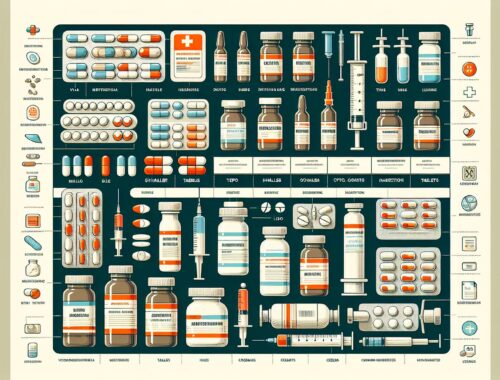
Different Types of Medicines
Medicines play a critical role in the field of healthcare, enabling us to alleviate symptoms, treat diseases, and improve overall wellbeing. There are various types and forms of medications designed to target specific ailments. In this article, we will explore some of the different classifications of medicines and their uses.
Introduction to Medicines
Medicines are substances that have therapeutic properties and are intended for use in the diagnosis, prevention, treatment, or cure of diseases. They are carefully developed and rigorously tested to ensure safety and effectiveness. Medicines can be derived from various sources, including plants, animals, and chemical synthesis.
Over-the-Counter Medicines
Over-the-counter (OTC) medicines are readily available for purchase without a prescription. These medications are typically used to treat common ailments like headaches, fevers, allergies, and stomach discomfort. OTC medicines provide fast and easily accessible relief for mild health issues. However, it is crucial to read instructions and follow recommended dosages to avoid misuse.
Prescription Medicines
Prescription medicines, also known as prescribed drugs, require a written order from a licensed healthcare professional, such as a doctor or a nurse practitioner. These medications are typically used to treat complex or chronic conditions, such as diabetes, high blood pressure, or bacterial infections. Prescription medicines often have potent effects and may require specific monitoring or dosage adjustments under medical supervision.
Generic Medicines
Generic medicines are copies of brand-name drugs that have the same active ingredients, dosage, strength, and intended use. They are equally safe and effective as their brand-name counterparts but are typically available at a lower cost. Generic medicines go through rigorous testing to ensure quality and are approved by regulatory authorities. They provide affordable options for patients who may require long-term medication.
Herbal Medicines
Herbal medicines have been used for centuries and are derived from plants and plant extracts. They are considered a form of alternative medicine, offering natural remedies for various health conditions. Herbal medicines come in different forms, including capsules, tablets, ointments, and teas. It’s important to note that while herbal medicines can provide relief for certain ailments, their efficacy and safety may vary. Consulting with healthcare professionals before use is advisable.
Vaccines
Vaccines are a powerful and essential type of medicine that helps prevent the spread of infectious diseases. They stimulate the immune system to recognize and fight specific pathogens, such as viruses or bacteria. Vaccines have been successful in eradicating or significantly reducing many life-threatening diseases, including polio, measles, and smallpox. Regular vaccination plays a crucial role in maintaining public health and preventing outbreaks.
Conclusion
Medicines come in various forms and serve diverse purposes within the healthcare sector. Whether it be over-the-counter or prescription medication, generic drugs, herbal remedies, or vaccines, each type plays a vital role in maintaining and restoring our health. It is essential to use medicines responsibly by following instructions, consulting professionals when needed, and being aware of potential side effects or interactions. By understanding the different types of medicines available, we can make informed decisions and take control of our wellbeing.
You May Also Like

Exploring the Different Types of Medicines
March 30, 2024
Exploring the Different Types of Medicines
March 20, 2024

